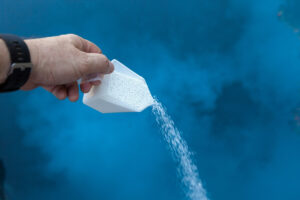In the pursuit of a healthy and active lifestyle, swimming is a popular choice for exercise and relaxation.
However, while the benefits of swimming for cardiovascular health and overall well-being are well-documented, it’s important to consider the potential impact on your skin.
“Can Swimming Damage Your Skin?” is an article that uncovers the often-overlooked aspects of skin care when it comes to aquatic activities.
From the effects of chlorine in pool water to tips on how to protect your skin before and after swimming, this article scouts out the potential risks and provides valuable insights to help you maintain healthy skin while enjoying your time in the water.
Can Swimming Damage Your Skin?
Swimming can potentially damage your skin due to prolonged exposure to chlorinated pool water, which can strip natural oils and moisture from the skin, leading to dryness and irritation. Additionally, frequent exposure to chlorinated water may exacerbate certain skin conditions like eczema. To minimize these risks, it’s advisable to rinse off and moisturize your skin after swimming and consider using a swim cap and protective skincare products.
The Impact of Chlorine on Skin

Chlorine is a widely used disinfectant in swimming pools to maintain water hygiene and safety.
While it plays a significant role in killing bacteria and preventing waterborne illnesses, prolonged exposure to chlorine can have several negative effects on the skin:
1. Dryness and Irritation: Chlorine is known to strip the skin of its natural oils. This can lead to dryness, flakiness, and a feeling of tightness in the skin.
In some cases, it can even cause itching and redness, particularly for individuals with sensitive skin.
2. Chemical Dermatitis: Chlorine exposure can result in a condition known as chemical dermatitis.
This is characterized by skin irritation, redness, and sometimes even the formation of small, itchy blisters.
Swimmers who spend extended periods in chlorinated pools are more susceptible to this condition.
3. Exacerbating Skin Conditions: If you have pre-existing skin conditions such as eczema or psoriasis, chlorine can exacerbate these conditions.
The drying effect of chlorine can worsen the symptoms of these conditions and lead to increased discomfort.
4. Hair and Nail Issues: In addition to affecting the skin, chlorine can also have a drying effect on hair and nails.
Swimmers may notice that their hair becomes brittle, discolored, or develops a greenish tint due to prolonged exposure to chlorine.
5. Eye Irritation: While not directly related to skin, it’s worth noting that chlorine can also irritate the eyes.
Swimmers may experience redness, itchiness, and discomfort in their eyes, commonly referred to as “swimmer’s eye.”
To mitigate the impact of chlorine on your skin, it’s advisable to take certain precautions.
These may include showering before and after swimming to remove chlorine from the skin’s surface, wearing a swim cap and goggles to minimize direct contact, and applying a moisturizing lotion or barrier cream before swimming to create a protective layer.
Understanding how chlorine affects your skin is essential for maintaining healthy skin while enjoying the benefits of swimming in chlorinated pools.
Dryness and Irritation: Common Skin Issues
“Dryness and Irritation: Common Skin Issues” is an important subtopic that addresses specific skin problems that individuals often encounter as a result of exposure to chlorinated water while swimming.
Here’s an elaboration on this subtopic:
1. Dry Skin: Chlorine, a disinfectant used in swimming pools, can strip the skin of its natural oils.
This process leads to dryness, where the skin lacks the moisture necessary to maintain its suppleness.
Dry skin can feel tight, rough, and itchy, causing discomfort for swimmers.
2. Itchiness: Dry skin, which often results from chlorine exposure, can be accompanied by persistent itching.
The itching sensation is a natural response to the skin’s dryness and may lead to scratching, which can further irritate the skin.
3. Redness: Some individuals may experience redness on their skin, particularly in areas exposed to chlorine.
This redness is a common sign of skin irritation and can occur due to the harsh effects of chlorine.
4. Tightness: Swimmers may notice that their skin feels unusually tight after swimming in chlorinated water for an extended period.
This sensation is a result of the skin losing its natural moisture and can contribute to discomfort.
5. Cracking and Flakiness: In severe cases of dryness, the skin may crack and develop flaky patches.
These areas are particularly prone to irritation and may require extra care to heal.
6. Long-Term Effects: Prolonged exposure to chlorinated water without proper skincare measures can result in chronic dryness and irritation.
This can be more pronounced in frequent swimmers, competitive athletes, or individuals who spend extended periods in pools.
To address dryness and irritation resulting from chlorinated water exposure, it’s essential to take preventive and remedial measures.
These may include moisturizing the skin before and after swimming, using hydrating cleansers, avoiding hot showers, and considering protective measures such as swim caps and barrier creams.
Post you may like: Can Swimming Damage Your Eyes?
Skin Conditions and Swimming
“Skin Conditions and Swimming” is a topic that explores how individuals with pre-existing skin conditions can be affected by swimming, particularly in chlorinated pools.
Here’s a more detailed discussion of this subject:
1. Eczema and Swimming: Eczema, a common skin condition characterized by inflammation and itching, can be exacerbated by chlorine exposure.
Chlorine’s drying effect and potential irritants in pool water can trigger or worsen eczema symptoms, leading to increased discomfort for swimmers with this condition.
2. Psoriasis and Chlorine: Psoriasis, a chronic skin condition characterized by rapid skin cell growth, can also be negatively affected by swimming in chlorinated pools.
Chlorine can irritate psoriatic skin, potentially causing flare-ups and making it more challenging to manage psoriasis symptoms.
3. Acne and Pool Water: Individuals with acne may wonder about the impact of swimming in chlorinated pools on their skin.
While chlorine can help disinfect the skin, excessive exposure may lead to dryness and irritation, potentially affecting acne-prone skin.
Proper skincare before and after swimming is essential for managing this balance.
4. Swimmer’s Itch: Although not related to chlorine exposure, it’s important to mention swimmer’s itch.
This condition is caused by parasites found in natural bodies of water and can affect swimmers who frequent such areas. It typically results in itchy, red bumps on the skin.
5. Precautions for Skin Conditions: Offer practical advice for individuals with skin conditions who want to enjoy swimming safely.
This may include applying moisturizers, barrier creams, or prescribed topical treatments before swimming.
Also, suggest taking showers immediately after swimming and using gentle, fragrance-free skincare products.
6. Alternative Swimming Options: Mention alternatives to chlorinated pools for individuals with particularly sensitive skin.
Saltwater pools and open-water swimming in natural, non-chlorinated environments can be less irritating options.
7. Consulting a Dermatologist: Encourage individuals with chronic skin conditions to consult a dermatologist for personalized recommendations on how to manage their specific skin condition while enjoying swimming.
Preventive Measures: How to Protect Your Skin
Here is a list of preventive measures and tips on how to protect your skin while swimming in chlorinated pools:
1. Shower Before Swimming: Take a thorough shower before entering the pool to wet your skin with fresh water. This can reduce the absorption of chlorine into your skin.
2. Apply a Barrier Cream: Use a specially formulated barrier cream or lotion designed to create a protective layer on your skin. This can help minimize direct contact with chlorine.
3. Wear a Swim Cap and Goggles: Consider wearing a swim cap to protect your hair and part of your forehead from direct chlorine exposure. Goggles can shield your eyes from irritation.
4. Stay Hydrated: Ensure you stay well-hydrated by drinking water before, during, and after swimming. Proper hydration can help counteract the drying effects of chlorine.
5. Moisturize Before and After: Apply a moisturizing lotion or cream both before and after swimming.
Pre-swim moisturizing creates a protective barrier, while post-swim moisturizing helps replenish lost moisture.
6. Rinse Immediately After Swimming: After leaving the pool, take a quick shower with fresh water as soon as possible. This can help wash away chlorine residue from your skin.
7. Use Gentle Cleansers: Opt for gentle, hydrating cleansers for your post-swim showers to avoid further drying out your skin.
8. Limit Chlorine Exposure: If possible, try to limit the duration of time you spend in chlorinated water, especially if you have sensitive skin or a skin condition.
9. Consider Alternatives: Explore alternative swimming options such as saltwater pools or open-water swimming in natural, non-chlorinated environments if you have particularly sensitive skin.
10. Consult a Dermatologist: If you have chronic skin conditions or severe sensitivities, consult a dermatologist.
They can provide personalized advice and recommend suitable skincare products tailored to your needs.
By following these preventive measures, you can enjoy swimming while minimizing the potential harm to your skin from chlorine exposure.
Choosing the Right Skincare Products
Choosing the right skincare products is crucial for maintaining healthy skin while swimming, especially in chlorinated pools.
Here’s a detailed overview of how to make informed choices when selecting skincare products for swimming:
1. Sunscreen with Added Benefits: Opt for sunscreen specifically designed for swimmers. These products are water-resistant and offer protection against both UV rays and chlorine.
Look for broad-spectrum sunscreens with SPF 30 or higher to shield your skin from harmful UV radiation.
2. Moisturizing Lotions: Choose moisturizing lotions or creams that are fragrance-free and hypoallergenic.
Look for products with ingredients like ceramides, hyaluronic acid, or glycerin, which can provide deep hydration. These products help combat the drying effects of chlorine on the skin.
3. Barrier Creams: Consider using barrier creams or lotions that create a protective layer on the skin. These products act as a physical barrier to reduce direct contact with chlorine.
Look for formulas designed for swimmers, and apply them before swimming for added protection.
4. Gentle Cleansers: After swimming, opt for gentle cleansers specifically formulated to be mild on the skin. Look for products that are soap-free and have a pH-balanced formula.
These cleansers will effectively remove chlorine residue without further drying out your skin.
5. Hydrating Body Wash: Use hydrating body washes designed to replenish the skin’s moisture levels.
Look for ingredients like aloe vera, shea butter, or oat extract, which can help soothe and hydrate the skin. Avoid body washes with harsh detergents or fragrances that may exacerbate skin irritation.
6. Fragrance-Free Products: Be cautious with products containing fragrances, as these can sometimes irritate sensitive skin.
Opt for fragrance-free or hypoallergenic options to minimize the risk of skin reactions.
7. Patch Testing: Before trying a new skincare product, perform a patch test on a small area of your skin to ensure it doesn’t cause any adverse reactions or allergies.
8. Dermatologist’s Recommendations: If you have specific skin concerns or conditions, consider consulting a dermatologist for personalized product recommendations.
They can provide guidance on the best skincare regimen tailored to your skin type and needs.
By carefully selecting the right skincare products, you can create a protective and nourishing skincare routine that helps safeguard your skin from the potential damage caused by chlorinated pool water while keeping it healthy and moisturized.
Post-Swim Skincare Routine
A post-swim skincare routine is essential for maintaining healthy skin after exposure to chlorinated water or other swimming environments.
Here’s a guide to an effective post-swim skincare routine:
1. Rinse Immediately: As soon as you exit the pool, head to the shower.
Rinse your entire body with fresh, lukewarm water to remove chlorine and pool chemicals from your skin.
Avoid hot water, as it can further dry out your skin.
2. Use a Gentle Cleanser: Choose a mild, hydrating cleanser to wash your body.
This will help remove any residual chlorine, saltwater, or pool chemicals while keeping your skin moisturized.
Avoid harsh soaps and scrubs that may exacerbate dryness.
3. Focus on Hair Care: If you’ve been swimming, your hair is also exposed to pool chemicals.
Rinse your hair thoroughly and use a chlorine-removing or clarifying shampoo to eliminate chlorine buildup.
Follow up with a moisturizing conditioner to restore hydration.
4. Exfoliate (Occasionally): Consider gentle exfoliation a couple of times a week to remove dead skin cells and promote skin renewal.
However, be cautious not to overdo it, as excessive exfoliation can lead to irritation. Use a mild exfoliating scrub or a soft exfoliating cloth.
5. Moisturize Liberally: After patting your skin dry with a clean, soft towel, apply a generous amount of a hydrating, fragrance-free moisturizer to your entire body.
Focus on areas that tend to get dry, such as elbows, knees, and feet.
Moisturizing helps lock in hydration and soothes dry, irritated skin.
6. Apply Lip Balm: Don’t forget to moisturize your lips, as they can also become dry and chapped after swimming.
Use a lip balm with hydrating ingredients to keep your lips soft and comfortable.
7. Eye Care: If your eyes were exposed to chlorinated water, rinse them gently with clean water to remove any residual chemicals.
If you wear contact lenses, consider using re-wetting drops to alleviate dryness.
8. Protect Sensitive Areas: If you have specific areas of your body that are particularly prone to dryness or irritation, consider using specialized creams or ointments to provide extra care.
9. Stay Hydrated: Drink plenty of water to rehydrate from the inside out. Staying well-hydrated is essential for maintaining skin health.
10. Sun Protection: If you plan to spend time outdoors after swimming, don’t forget to apply sunscreen to protect your skin from UV damage.
Post you may be interested in: Can Swimming Damage Your Knees?
Healthy Swimming Practices for Your Skin
Practicing healthy swimming habits can help protect your skin from the potential effects of chlorinated water and maintain its health.
Here’s a list of healthy swimming practices for your skin:
1. Shower Before Swimming: Take a pre-swim shower to wet your skin with fresh water.
This helps reduce the absorption of chlorine and other pool chemicals.
2. Apply Barrier Cream: Consider applying a specialized barrier cream or lotion to create a protective layer on your skin before entering the pool.
This can minimize direct contact with chlorine.
3. Wear Swimwear with Good Coverage: Choose swimwear that provides adequate coverage to minimize the amount of skin exposed to chlorinated water.
Long-sleeved rash guards and swim leggings are excellent options.
4. Stay Hydrated: Maintain proper hydration by drinking water before, during, and after swimming. Staying well-hydrated helps counteract the drying effects of chlorine.
5. Limit Chlorine Exposure: If possible, try to limit the time you spend in chlorinated water, especially if you have sensitive skin or a skin condition. Shorter swimming sessions can reduce the impact on your skin.
6. Rinse Off Immediately: After leaving the pool, take a quick shower with fresh water as soon as possible to wash away chlorine residue from your skin.
7. Use Gentle Cleansers: Opt for mild, hydrating cleansers for post-swim showers.
Look for products that are soap-free and have a pH-balanced formula to cleanse your skin without further drying it out.
8. Moisturize After Swimming: Apply a moisturizing lotion or cream to your skin immediately after swimming to replenish lost moisture and prevent dryness.
9. Protect Your Eyes: If you wear contact lenses, consider using protective swim goggles to prevent irritation from chlorinated water.
Rinse your eyes with clean water if they come into contact with pool chemicals.
10. Dry Thoroughly: Pat your skin dry gently with a clean, soft towel after swimming. Avoid rubbing vigorously, as this can cause additional irritation.
11. Lip Balm: Use a lip balm with hydrating ingredients to keep your lips moist and protected from dryness and chapping.
12. Consult a Dermatologist: If you have specific skin concerns or conditions, consult a dermatologist for personalized advice and product recommendations to protect your skin while swimming.
Balancing the Benefits and Risks
Balancing the benefits and risks of swimming, particularly in chlorinated pools, is crucial for maintaining overall health and skin wellness.
Here’s an explanation of this balance:
1. Benefits of Swimming
Cardiovascular Health: Swimming is an excellent cardiovascular exercise that helps improve heart health, increase lung capacity, and enhance overall fitness.
Stress Reduction: Swimming can be a relaxing and stress-relieving activity, helping to reduce anxiety and promote mental well-being.
Weight Management: Regular swimming can assist in weight management by burning calories and toning muscles.
Joint-Friendly: Unlike high-impact activities, swimming is gentle on the joints, making it suitable for individuals with arthritis or joint pain.
Improved Flexibility and Strength: Swimming engages various muscle groups, enhancing flexibility and strength.
2. Risks to Skin:
Chlorine Exposure: Chlorinated pool water can strip the skin of its natural oils, leading to dryness, itchiness, and irritation.
Skin Conditions: For individuals with sensitive skin or pre-existing skin conditions like eczema or psoriasis, chlorine exposure can exacerbate symptoms.
Hair and Nail Damage: Chlorine can also affect hair and nails, leading to dryness, brittleness, and discoloration.
3. Balancing Act
Balancing the benefits and risks involves taking proactive steps to mitigate potential harm to your skin while enjoying the advantages of swimming. Here are some strategies:
Preventive Measures: Implement preventive measures like showering before and after swimming, applying barrier creams, and wearing swim caps and goggles.
Hydration: Stay well-hydrated before, during, and after swimming to combat the drying effects of chlorine.
Proper Skincare: Choose the right skincare products, including moisturizers, gentle cleansers, and sunscreen, to protect your skin.
Limit Exposure: Consider limiting the duration and frequency of chlorinated pool swimming, especially if you have sensitive skin.
Consult a Dermatologist: Seek guidance from a dermatologist for personalized skincare recommendations, especially if you have specific skin concerns or conditions.
Balancing the benefits and risks of swimming involves being mindful of the potential impact on your skin and taking proactive measures to maintain skin health while enjoying the many advantages of this valuable form of exercise and recreation.
Consulting a Dermatologist
If swimming damages your skin, seeking guidance from a dermatologist becomes even more significant.
Dermatologists are skilled at diagnosing and managing skin issues related to swimming, such as dryness, irritation, and chlorine-induced reactions.
They can provide tailored treatments, recommend specialized skincare products, and advise on preventive measures to protect your skin while continuing to enjoy the benefits of swimming.
Whether you’re dealing with acute skin problems or seeking long-term solutions to minimize the impact of chlorinated water, consulting a dermatologist ensures that your skin health remains a top priority.
Their expertise can help you maintain healthy skin, allowing you to relish your aquatic pursuits without compromising your skin’s well-being.
Enjoying Swimming with Healthy Skin
Enjoying swimming with healthy skin is not only achievable but also essential for overall well-being.
While swimming offers numerous physical and mental health benefits, it’s crucial to be mindful of the potential impact on your skin, especially when exposed to chlorinated water.
By following a well-rounded approach to skincare, you can strike a balance between the pleasures of swimming and maintaining skin health.
Remember to take preventive measures such as showering before and after swimming, applying barrier creams, and wearing protective gear like swim caps and goggles.
Choose the right skincare products, including gentle cleansers, moisturizers, and sunscreen, to shield your skin from chlorine’s drying effects.
Consulting a dermatologist for personalized guidance and recommendations, particularly if you have specific skin concerns or conditions, is a prudent step to ensure that your skin remains in the best possible condition.
Ultimately, with proper care and a commitment to healthy skincare practices, you can fully enjoy the benefits of swimming while keeping your skin vibrant, comfortable, and resilient.



